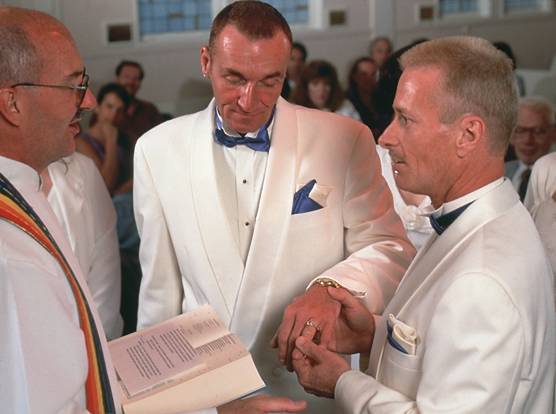|

HOME |
ABOUT | INDEX |
NEWS |
FACEBOOK |
CONTACT
MONOGAMY
Fidelity | Commitment | Loyalty


Same Sex Marriage
LGBTQ Relationships
Polyamory Lifestyle
Love and Commitment
Gay and Straight Spouses
Friendships and Non-Romantic
Partners

What is Monogamy?
Monogamy is the practice or state of being married to
one person at a time. it is the practice or state
of having a sexual relationship with only one partner.
it is the habit of having only one mate at a time.
Sexual monogamy refers to two
partners remaining sexually exclusive with each other
and having no outside sex partners. genetic monogamy
refers to sexually monogamous relationships with genetic
evidence of paternity.
Monogamy is a form of relationship in which an
individual has only one partner during their lifetime.
it can also describe having only one partner at any one
time (serial monogamy) as compared to non-monogamy
(polygamy, polyamory). The term is also applied to the
social behavior of some animals, referring to the state
of having only one mate at any one time.



What percentage of humans are monogamous? Only 3 percent
to 5 percent of the roughly 5,000 species of mammals
(including humans) are known to form lifelong,
monogamous bonds , with the loyal superstars including
beavers, wolves and some bats. Social monogamy is a term
referring to creatures that pair up to mate and raise
offspring but still have flings.
What does it mean to be monogamous? Monogamy is when you
are married to, or in a sexual relationship with, one
person at a time. Humans are one of the few species that
practice monogamy. Well, sometimes. You may have heard
of something called polygamy, which is having more than
one spouse at a time.
Slate: Gay Men and Monogamy
Gay and Lesbian Relationships: Monogamous Ever After?
Huff Post: Is Monogamy Among Gay Men the New Normal?
Info: Love and Commitment
Is Non-Monogamy For Me?
Study Reveals Monogamous and Open
Relationships are Equally Fulfilling
Habits That Keep Couples Faithful
Monogamous and Non-Monogamous Lesbians
Fidelity in Relationships
How a Grass-Is-Greener Mentality Ruined My First Queer
Relationship



Terminology
Monogamy - Having a single long-term sexual partner
Commitment Marriage - Non-legal marriage binding two
people together with the use of a traditional wedding
ring opposed to legal documents
Marriage - Legal and social binding between two people
that stretches beyond the boundaries of a committed
relationship
Adultery - General term referring to infidelity,
cheating, or extramarital affairs
Sexual Infidelity - Having a sexual relationship without
a commitment to have no other sexual partners
Sexual Fidelity - Not having other sexual partners other
than one's committed partner, even temporarily
Serial Monogamy - Having a series of monogamous
relationships, one after the other
Open Relationship - Commitment to a partner without
excluding other romantic or sexual involvement
Polygamy - Having multiple long-term sexual partners
Polyandry - Having multiple long-term male sexual
partners
Polygyny - Having multiple long-term female sexual
partners
Polyamory -
Practice
of intimate relationships where individuals may have
more than one partner, with the knowledge and consent of
all partners
Promiscuity - Having several different sexual partners on
a casual basis
(one night stand)
Abstinence
- Voluntary self-enforced limit or restraint
in engaging in any type of sexual intercourse or sex
play with a partner
Celibacy - State of voluntarily being unmarried, sexually
abstinent, or both, usually for religious reasons
Virginity - State of never having had sexual intercourse
Chastity - State or practice of refraining from
extramarital, or especially from all, sexual
intercourse
Definition and Discussion of Monogamy
Video: Monogamy Explained
Signs That a Monogamous Relationship is Not for You
Rethinking Monogamy
Video: Defining Monogamy
Why You Should (and Should Not) Be Monogamous
Info: LGBTQ Relationships
Steps to Being Faithful
Commitment Survey: Queer Female Relationships




Committed Relationship
On a scale that describes your commitment style, your
relationship could be defined as ... casual ...
polyamorous ... or monogamous.
A committed relationship is an interpersonal
relationship based upon a mutually agreed-upon
commitment to one another involving love, trust,
honesty, openness, or some other agreed-upon behavior.
Forms of committed relationships are: close friendship,
long-term relationships, engagement, marriage, and civil
unions. The term is most commonly used with informal
relationships, such as "going steady," but may encompass
any relationship where an expressed commitment is
involved.
At the top of nearly every survey about what singles
want in a partner is a person who is faithful, loyal,
and trustworthy. In other words, singles in a committed
relationship want someone who will not cheat on them.


Pink: Gay Millennials Love Monogamy
Info: My Spouse is Gay
Definition: Virginity
Beyond the U-Haul: Lesbians in Committed Relationships
Info: Same Sex Marriage
Out: Gay Men Opposed to Open Relationships?
US
Attitudes: Extramarital Affairs in 1971
Steps to Being Faithful
Commitment Survey: Queer Female Relationships
Advocate: Gay Marriage, Monogamy, and the Lure of Open
Relationships
My Husband Was Cheating With A Man: So We
Made An Unexpected Life-Changing Decision
Unfortunately, the reality of that desire often comes to
a painful end as time goes on. Accurate statistics are
hard to come by (because lots of people don’t want to
admit to cheating), but researchers agree that 30 to 50
percent of men and 20 to 40 percent of women are
unfaithful. Can you ever know for sure that your partner
won’t cheat? No, because people and circumstances change
over time.
Despite what most people seem to think, falling in love
does not guarantee loyalty – from either party. Falling
in love doesn’t even guarantee staying in love, so even
if the apple of your eye is the only apple you see, it
doesn’t guarantee that you won’t want to have an orange
some time down the line. Love is a living, breathing
thing that requires constant attention and nurturing.
With that said, it’s easily understandable that there
will come a time when your loyalty is tested. There will
be a time when you will have to make a decision to
either remain faithful or have a bite of the forbidden
fruit.


Emotional fidelity simply means that one remains
emotionally faithful by not being too flirtatious or
provocative with another person. Thus, instead of
spending emotional capital by even innocently flirting
with someone other than your spouse, that “currency”
should be spent in the emotional economy of your
marriage (or committed relationship).
Habits That Keep Couples Faithful
Video: Defining Monogamy
Why You Should (and Should Not) Be Monogamous
Fidelity in Relationships
Is Non-Monogamy For Me?
Info: My Spouse is Gay
What Does Being Faithful Mean?
US
Attitudes: Extramarital Affairs in 1971
Being Faithful in the Hook-Up Culture
Steps to Being Faithful
Info: Love and Commitment



Habits
That Keep Couples Faithful
Getting cheated on is
probably one of the worst things that can happen to you
when you're in a relationship. Even if you make the
choice to leave, it's hard to get over the feelings of
betrayal infidelity usually leaves you with. Although
there are no ways to predict what will happen in your
relationship, cheating doesn't have to be one of them.
But luckily, marriage counselors say you can learn how
to keep your partner from cheating.
Experts say that this doesn't mean you should employ
manipulative tactics, but rather devote the time and
care into your relationship to make sure your partner
knows how you feel. "Everyone is susceptible to an
affair because we need this connection. We need to feel
like we matter, are cared for, and loved by our
partner," Licensed Clinical Marriage and Family
Therapist, Jessica Schroeder, states. "I have seen
really great marriages become affected by affairs
because the emotional connection has gone away. We need
to work at maintaining the emotional connection every
day in our marriage."
Relationships, like anything of importance in life, take
serious work. If you're not staying connected through
communication or other means, experts say your
relationship won't last. It won't matter whether someone
cheated or not. So if you want to keep fidelity part of
your relationship, here's what you should do, according
to marriage counselors.


Reasons for Being (And Staying) Monogamous
Ways to Know If Your Partner Will Be Faithful
How Faithful Are You in Your Marriage?
Guide to Non-Monogamous Relationships
Study Reveals Monogamous and Open
Relationships are Equally Fulfilling
Info: Asexuality
TED Talk: Is Casual Sex Bad For You?
Monogamy vs. Non-Monogamy
Terminology: Monogamous and Non-Monogamous Relationships
Definition: Virginity
Be Honest About What You Need - "Couples who are open
with each other create a more secure environment for
their partners," Judi Cinéas, PhD, psychotherapist and
marriage counselor, says. Many times, people stray from
their relationships because they're searching for
something they just don't get at home. "Fostering open
communication allows you and your partner to know each
other and know each other’s wants and needs," Cinéas
says. "It also creates a space where your partner can
communicate their desires."
Be Open-Minded - Although Cinéas says that doesn't mean
you have to go along with anything sexual you're not
comfortable with, it's important to not shut your
partner down down or judge them. Show that you are
listening, and keep an open discussion about what can
work for the both of you. "Keep an open mind to nurture
excitement in your relationship," she says. "You don’t
necessarily have to go against your values or give up
your dealbreakers. It simply means that you will listen
and continue to work with your partner to keep things
exciting."
Be Mindful To Never Put Them Down - Don't ever use your
partner's faults, flaws, or insecurities against them in
any way, especially during fights. "If your partner asks
for something, even if you are not willing to give that
to them, don’t make the feel bad for asking and don’t
hold it against them ever," Cinéas says. Opening up and
being vulnerable requires a lot of risk. "If they know
that telling you certain things could change the way you
see them, they may be less willing to share in the
future." Always make sure you're letting your partner
know you value them.


Habits That Keep Couples Faithful
Video: Defining Monogamy
Is Non-Monogamy For Me?
My Husband Was Cheating With A Man: So We
Made An Unexpected Life-Changing Decision
Why You Should (and Should Not) Be Monogamous
Fidelity in Relationships
Info: My Spouse is Gay
What Does Being Faithful Mean?
How a Grass-Is-Greener Mentality Ruined My First Queer
Relationship
US
Attitudes: Extramarital Affairs in 1971
Share Experiences Together - Sharing experiences in and
out of the bedroom can strengthen the bond you have
together. "The strength of your bond can impact how or
even whether or not you and your needs are considered in
your partner’s decisions, choices and behaviors," Cinéas
says.
Keep Your Relationship And Your Partner A Priority -
People often stray when they're in search of the
validation that they're desired, Cinéas says. Typically,
those feelings of passion and desire are super prevalent
in the beginning of the relationship when everything's
new. If you want to limit the risk of your partner
cheating, maintain the passion in your relationship by
making your partner feel like they're a priority in your
life. "Helping to meet that need to be desired can
remove what is often cited a reason for infidelity," she
says.
Always Respect Yourself And Your Partner - Respect for
yourself and your partner are also very crucial to
maintaining a relationship, Cinéas says. If you don't
respect your partner, you'll lose them. It's that
simple. If you're not giving them the respect they need,
they're more likely to look for it elsewhere.


Don't Get Complacent - "Don’t think that just because
you think everything is going great, your partner feels
the same," Lesli Doares, marriage counselor and author,
explains. Make sure to keep talking about what's working
and what, if anything, needs tweaking in your
relationship. "This conversation needs to be had
regularly but is critical after any major change (a
move, new job, the birth of a child)." Never stop
putting in the effort to deepen and strengthen your
relationship.
Getting cheated on is never your fault. According to
Doares, even if you've found a good partner, any
relationship can become vulnerable to cheating. It's
just important to never take your partner or your
relationship for granted. Life can get in the way
sometimes and your relationship can be put on the
back-burner. But if you make the commitment to stay
connected and communicate well, you can reduce the risk
of infidelity in your relationship.
[Source: Kristine
Fellizar, Bustle, Feb 2018]
Being Faithful in the Hook-Up Culture
Steps to Being Faithful
Guide to Non-Monogamous Relationships
Info: Love and Commitment
Reasons for Being (And Staying) Monogamous
Ways to Know If Your Partner Will Be Faithful
How Faithful Are You in Your Marriage?
Info: Asexuality
Monogamy vs. Non-Monogamy
Terminology: Monogamous and Non-Monogamous Relationships
Monogamous Mike

Fidelity, Loyalty, Trust
Words that help define a loving relationship....
fidelity, loyalty, commitment, trust, respect, honesty,
consistency.
A committed relationship is an interpersonal
relationship based upon a mutually agreed-upon
commitment to one another involving love, trust,
loyalty, faithfulness, honesty, and openness. Forms of
committed relationships include close friendship,
long-term relationships, long-term dating, going steady,
engagement, marriage, and civil unions.
Fidelity is the quality of faithfulness or loyalty.
Loyalty means your spouse or partner has an unbreakable
feeling of adherence, devotion, support and admiration
to you, and will stand by your side, even go through
hell with you if that is what is necessary. Fidelity
(faithfulness) simply means keeping the promises she/he
made to you.
Perhaps loyalty is bigger than fidelity. While being
unfaithful is about someone who breaks promises, being
disloyalty is about someone who will leave me when
circumstances change or things get rough.
Monogamy vs. Non-Monogamy
Terminology: Monogamous and Non-Monogamous Relationships
Reasons for Being (And Staying) Monogamous
Monogamous Mike
Beyond the U-Haul: Lesbians in Committed Relationships
Info: Same Sex Marriage
Out: Gay Men Opposed to Open Relationships?
US
Attitudes: Extramarital Affairs in 1971
Advocate: Gay Marriage, Monogamy, and the Lure of Open
Relationships
Loyalty means your spouse or partner has your back,
believes in you, and wants to help you become your best.
Fidelity means your spouse is not having sex with
others, not wanting sex with others, and doesn't flirt
with others. They are two qualities most people look
for, along with honesty, in their spouse.
What does trust mean? Trusting someone means that you
think they are reliable, you have confidence in them and
you feel safe with them physically and emotionally.
Trust is something that two people in a relationship can
build together when they decide to commit to each other.
Is my spouse or partner consistent with me? Am I
consistent with them? Each person in a relationship
demonstrates their trustworthiness through consistency
in their actions. The first behaviors you look at might
be relatively small, like showing up for dates at
agreed-upon times. Keeping private information just
between the two of you and always respecting boundaries
are other clues someone is dependable. Learning these
things in a relationship happens gradually, as you both
show that you are consistent with your actions not just
occasionally, but all the time.
Slate: Gay Men and Monogamy
Gay and Lesbian Relationships: Monogamous Ever After?
Huff Post: Is Monogamy Among Gay Men the New Normal?
Info: Love and Commitment
Study Reveals Monogamous and Open
Relationships are Equally Fulfilling
Habits That Keep Couples Faithful
Monogamous and Non-Monogamous Lesbians
Fidelity in Relationships
Guide to Non-Monogamous Relationships
How a Grass-Is-Greener Mentality Ruined My First Queer
Relationship


Fidelity in Relationships
Fidelity is one of the most stressed aspects of a
relationship. Fidelity or loyalty boils down to the same
thing; you both have agreed that your partner has your
love, affection and commitment over other potential
partners. Fidelity can be a complicated thing though,
especially if one partner considers a certain act to be
cheating, while the other partner doesn't see the big
deal.
Physical Fidelity - Physical fidelity is perhaps the
easiest type of fidelity to measure. If two partners are
in a committed relationship, it means that they won't
have sex with other people. Each relationship is
different though, and the two people in it need to
establish what is and what isn't considered a breech of
physical fidelity. For instance, is it all right for a
woman to kiss her ex hello, even if it's a traditional
greeting where he comes from? Is it acceptable for a man
to accept hugs from other women? These are the sorts of
issues that, if left untended, can breed jealousy.
Emotional Fidelity - While it's a romantic notion that
all you need is love, those who live in the real world
know that isn't true. While being with your partner
might fulfill some of your emotional needs, there is no
relationship where your significant other can be
everything to you. Emotional fidelity means that, even
though you go and spend time with friends or co-workers,
you don't allow your emotional attachment to those
people to overcome the emotional fidelity you have to
your partner. When emotional infidelity happens,
partners have to work out the problems the same way they
would if physical infidelity happened.


Pink: Gay Millennials Love Monogamy
Info: My Spouse is Gay
Definition: Virginity
Beyond the U-Haul: Lesbians in Committed Relationships
Info: Same Sex Marriage
Out: Gay Men Opposed to Open Relationships?
My Husband Was Cheating With A Man: So We
Made An Unexpected Life-Changing Decision
Steps to Being Faithful
Commitment Survey: Queer Female Relationships
Advocate: Gay Marriage, Monogamy, and the Lure of Open
Relationships
Open Relationships - One of the alternatives to
traditional relationships is something called an open
relationship. An open relationship functions off of the
idea that human beings are not hard-wired to be with
only a single partner, so they shouldn't try to be. Two
people may admit that they are important to one another
and that they love each other, but that's no reason they
shouldn't have other close friends or lovers if they so
choose, as long as those other lovers don't become more
important than their partners. These relationships
require communication between all partners.
Jealousy - Jealousy is a reaction to perceived
infidelity. Let's say that one partner wants to go out
and have lunch with his ex, who his current partner
knows he still has feelings for. That sort of situation
can lead to jealousy that he's spending time with his ex
rather than his current partner. Jealousy can be
corrosive to fidelity, and it even may push partners
apart because the jealous partner will be seen as
controlling or unreasonable.
Communication - The best way to maintain fidelity in a
relationship is to communicate. Both partners have to
learn to trust each other, and they have to be open and
honest about their feelings and desires. If partners
start keeping secrets or they don't really trust each
other, then that is fertile ground for infidelity to
occur. If the relationship can't be saved and partners
don't want to commit to each other anymore, than it's
usually best to end the relationship first, so each
person is free to pursue other options.
[Source: By: Neal Litherland, Match.Com]

Monogamish
The Urban Dictionary defines monogamish as "a
relationship that is mostly monogamous, but occasionally
exceptions are made for sexual play with persons outside
the relationship."
“My boyfriend and I are monogamish, so it's cool if you
want to make out with me.”
According to Dan Savage, who coined the term, "It isn’t
a word for people who want to sleep around whenever they
feel like it without their partner knowing about it.
Monogamish is more about an agreement that allows for
one-off encounters in certain circumstances that have
been previously agreed upon. You are committed to one
person, but you can also play around from time-to-time."
Monogamish vs. Open Relationship
What It Really Means to be Monogamish
Info: Polyamory Lifestyle
Monogamish: Is It Cheating If We Agree on it First?
Info: My Spouse is Gay
Dan Savage Video: Monogamy is Ridiculous
TED Talk: Unsexy Truth of Hookup Culture
Guide to Non-Monogamous Relationships
Is Non-Monogamy For Me?
Virtues of Infidelity
Affair of
the Heart
An affair
is a romantic and emotionally intense sexual or
emotional relationship with someone other than your
spouse or partner. Generally, affairs do not last long
(though there are exceptions) and occur between two
people who are not married or otherwise committed to one
another. Sex may or may not be involved in an affair,
and cyber affairs can happen between two people who may
never even meet one another.


Typically,
an affair is considered a betrayal of trust. It has the
ability to cause significant distress in relationships
and there are many reasons why people cheat on their
partners. Affairs are commonly referred to as
"adultery" among married couples and "infidelity" among
common-law spouses and committed partners. An affair can
go by other names as well, depending on the type of
affair involved. Infidelity can even happen with same
sex couples.
What's important to remember is that your definition of
an affair is what matters most. Every person and every
relationship is unique, and some couples may differ in
the way they view this subject. There are different
types of affairs. And infidelity doesn't necessarily
have to involve sex. The most common types of affairs
include: Romantic, Emotional, Cyber, Sanctioned.
Obscure Words for Infidelity
Definition and Description of a Fling
Info: Polyamory
Gay Men in Open Relationships
Different Types of Affairs
Info: My Spouse is Gay
Cuckhold or Adulteress
Lesbian Couples and Emotional Cheating
Info: On the Downlow
Having a
Fling
"Fling" describes a brief
sexual or romantic affair. The term comes from the
manner in which individuals "throw" themselves into such
affairs. Flings are consensual but fleeting unions. They
are temporary expressions or explorations of attraction
between two people.
Individuals in a fling are drawn to one another
intensely, but their intimacy is not the same as love.
More often, it is the product of physical lust or
emotional connection.
Flings are sometimes regarded as insignificant and fun,
but fleeting. They can be quickly forgotten. They may be
the result of extramarital affairs, and can lead to
serious consequences or regrets.


Flings often happen on vacation or in circumstances
outside of normal daily routine. They are usually based
in fantasy rather than reality. The experience is one of
shared illusion and indulgence.
Flings are temporary but their effects can linger. When
people romanticize a fling as powerful, deep or
fulfilling, they may long to continue that relationship
or reconnect. If the fling results in pregnancy or other
serious outcome, it can affect one's life significantly.
Flings are temporary but their effects can linger. When
people romanticize a fling as powerful, deep or
fulfilling, they may long to continue that relationship
or reconnect. If the fling results in pregnancy or other
serious outcome, it can affect one's life significantly.
Flings are often tied to identity issues. For teens and
adults alike, they may be a sign of sexual awakening or
the need for change or independence. Flings may be an
act of rebellion, a sexual experiment, a test of one's
own attractiveness or the expression of romantic ideals.
Obscure Words for Infidelity
Definition and Description of a Fling
Guide to Non-Monogamous Relationships
Info: Polyamory
Gay Men in Open Relationships
Different Types of Affairs
Info: My Spouse is Gay
Counselor Advice: Long Term Affair or Marriage?
Cuckhold or Adulteress
Lesbian Couples and Emotional Cheating
Info: On the Downlow
TED Talk: Unsexy Truth of Hookup Culture
Having an Affair: Nightmare or Happy Ending?
My Husband Was Cheating With A Man: So We
Made An Unexpected Life-Changing Decision

What does it mean to have a fling with someone?
Having a fling with someone means the relationship (if
it can even be called that) is non-committal, there are
no strings attached, you never expect it to get serious,
and it not expected to last forever.
A fling would be a rather short term encounter (at least
once, but could be several times and usually involving
sex) with someone where little or no emotional
commitment is really made to the other person by both
(or at least one) of the people. One or both of these
people may or may be be in a marriage or relationship at
the time.
According to Heidi Fleiss, the Hollywood Madam, a fling
is anything that lasts from two days to nine months.
Anything shorter is a one-night stand, and anything
longer is a long term relationship (or true love).


Fling - Brief sexual or romantic affair. Consensual but
fleeting unions. Temporary expressions or explorations
of attraction between two people.
Affair -
Romantic
and emotionally intense sexual or emotional relationship
with someone other than your spouse or partner. Covert
extramarital activity.
Infidelity - Having a romantic or sexual relationship
with someone other than one's husband, wife, or partner.
Being unfaithful to a spouse or other sexual partner.
Unfaithfulness to a moral obligation. Disloyalty. Occurs
when a person who is married or in a steady relationship
has sex with another person.
Adultery - Voluntary sexual intercourse between a
married person and a person who is not his or her lawful
spouse. Another word for cheating (Cheating on your
spouse with another person). Adultery isn't a crime, but
some people consider it a sin.


Difference Between Infidelity and Adultery - Adultery is
sexual intercourse by a married person with someone
other than their spouse while infidelity is
unfaithfulness in marriage. it is the practice or
instance of having a sexual or romantic affair with
someone other than one's spouse, without the consent of
the spouse.
Cuckholding - Archaic term for a man whose wife is
unfaithful. Man who is aware of his wife’s infidelity
and acquiesces to it. Man whose wife has sex with
someone else. Man whose wife commits adultery.
Husband of an adulterous wife
Hotwifing - Modern fetish term for wife-sharing. A
hotwife is a married woman who has sexual relationships
outside of her marriage, with the full knowledge and
consent of her husband, who himself doesn’t have
affairs. Wife-sharing arrangement or act of carrying out
such affairs. The idea of hotwifing comes from the
concept of a husband showing off and sharing his “hot
wife.” The non-monogamous arrangement is related to a
cuckolding fetish, and many (but not all) husbands in
such a relationship refer to themselves as cuckolds or
hotwifers.
Difference Between Hotwifing and Cheating - Consent.
In a hotwife arrangement, the husband is fully aware and
supportive of his wife’s affairs. In many cases, one
spouse or the other even gains sexual arousal from the
arrangement due to voyeurism, the thrill of doing
something taboo, or an infidelity and/or jealousy
fetish. Hotwifing isn’t exactly swinging because
only one partner is having extramarital sex. One of the
most important aspects though is that both partners are
open and trusting with each other. It only works if both
partners are mutually onboard.
Obscure Words for Infidelity
Definition and Description of a Fling
Guide to Non-Monogamous Relationships
Info: Polyamory
Gay Men in Open Relationships
Different Types of Affairs
Info: My Spouse is Gay
Is Non-Monogamy For Me?
Cuckhold or Adulteress
TED Talk: Is Casual Sex Bad For You?
Lesbian Couples and Emotional Cheating
Info: On the Downlow
Monogamous Mike
HOME
QUEER CAFE
│ LGBTQ Information Network │ Established 2017
|